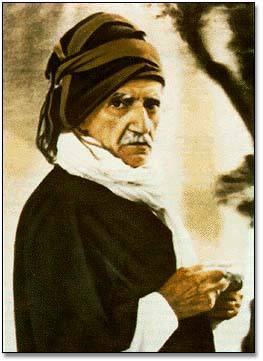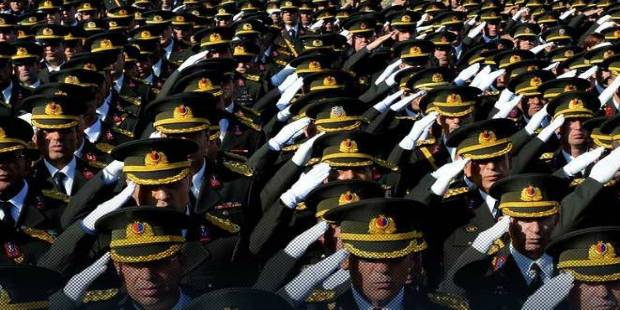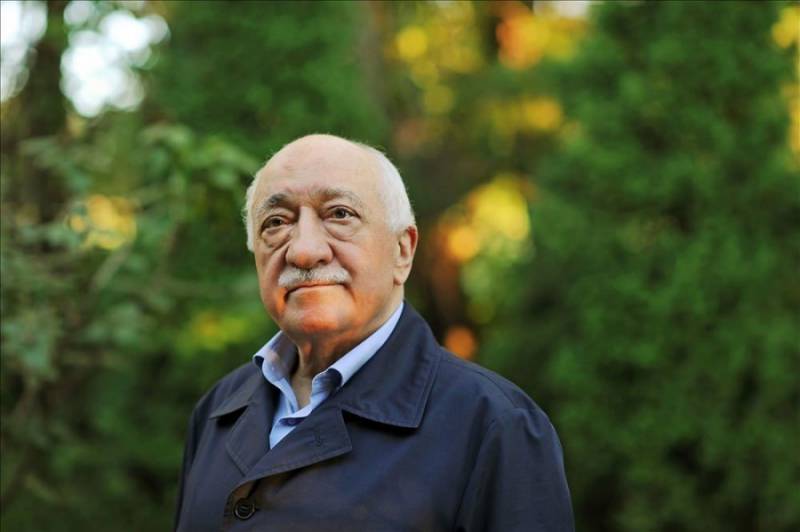Turkish decomposed. Preacher Gulen, "parallel structures" and attempted coup
The real impact of the ideas of Fethullah Gulen on Turkish society is not exaggerated. This is truly one of the most influential Turks of our time, and its authority is recognized not only in Turkey, but throughout the Islamic world. Funds and organizations created by Gulen operate in the countries of the Middle East, Transcaucasia and Central Asia, North and East Africa, in the territory of the Russian Federation - in the republics, territories and regions of the North Caucasus and Volga region, in the Crimea.
Fethullah Gülen is seventy-five years old. He was born in 1941 in a religious family of Kurdish origin. Gülen's father Ramiz Gülen was an imam, and Fethullah chose the same path for himself. He received a traditional Islamic education, learned the Qur'an in 10 years, becoming hafiz (Muslims call people who know the Quran by heart), and served as an imam until 1981, after which he retired and focused on literary, philosophical and preaching work. If you compare the ideas of Fethullah Gülen with the theoretical constructs of other religious and fundamentalist ideologues, then they look, at first glance, quite attractive. First of all, they are based on the Sufi interpretation of Islam, which has traditionally been common in the Ottoman Empire.
The concept of Gulen is one of the modifications of the views of Said Nursi. Kurd Badiuzaman Said Nursi (1878-1960) preached in the first half of the twentieth century. Having lived a long and difficult life, Said Nursi was a follower of Turkish Sufism. He argued that Islam would achieve world domination, but focused exclusively on peaceful preaching and advocated a benevolent attitude towards Christians and Jews - the “people of Scripture”, for developing inter-religious dialogue with representatives of the Catholic and Orthodox churches, Jewish rabbis — and then the possibility meetings and consultations between representatives of different faiths seemed fantastic. The Treatises of Light written by Nursi (Risale-i-Nur) were translated into many languages of the world, but in Russia, in 2007, some of the works of Nursi were recognized as extremist and prohibited.

However, Nursist organizations continue to be active around the world. The importance of Nursi’s ideas for Turkish society was also recognized by Recep Erdogan himself, and they found the modern incarnation in the views of Fethullah Gulen. Gülen prefers to refer to the special Turkish model of relations between people of different faiths and emphasizes that tolerance reigned in the Ottoman Empire, a unique cultural environment was created for the interaction of different peoples and faiths. Therefore, Gulen advocates a peace-loving relationship with the "people of Scripture", which, as we know, Muslims classify Christians and Jews. At the same time, Gülen was always negatively disposed towards atheists, although he did not deny the need to study physics, chemistry, mathematics and other sciences, considering it a godly deed. According to Gülen, the modern Islamic world will only be enriched if it perceives the positive achievements of other cultures, especially in the scientific field. In fact, benevolence towards people of other confessions and cultures is considered as the most important tool for peaceful preaching. It is precisely the peaceful preaching that people perceive much more positively than the aggressive imposition of any tenets and principles.
Politically, Gülen holds democratic convictions. He advocates democracy and human rights, at the same time criticizing laicism - “secularism”, considered since the times of Mustafa Kemal Ataturk one of the most important pillars of Turkish statehood. The West is impressed by Gulen’s positive attitude towards the idea of Turkey joining the European Union, as well as harsh criticism of terrorism. By the way, Fethullah Gülen became the first world-class Muslim religious leader to condemn the 11 events of September 2001 in the United States. According to Gülen, terrorists go to hell forever for the killing of innocent people, because their activities are contrary to Islam. Of course, it was precisely the declaration of such an attitude towards terrorism and the preaching of a friendly attitude towards people of all faiths and nationalities provided Gulen with the image of a progressive leader and peacemaker in the eyes of the American and European public. Having left for 1999 in the United States for treatment, Fethullah Gulen never returned to Turkey. He resides in the state of Pennsylvania, seeking to refrain from contact with the media and, in general, leading the reclusive life of a retiree - a political émigré. Fethullah Gülen’s long-term residence in the United States gives many analysts reason to talk about the pro-American positions of the Gülen men and the possible connections of the preacher and his closest associates with the American special services. Of course, there are certain reasons for this. Who can believe that the leader of a religious organization that has branches all over the world and millions of supporters has been living in the USA for almost twenty years and at the same time does not arouse interest in the American special services?

Not returning to Turkey from the United States. Gülen, in general, did the right thing. Already in 2000, a trial was initiated against the preacher. The schools opened by the Hizmet’s Gülen movement have long been banned in Turkey, and law enforcement agencies are persecuting anyone who is in one way or another connected with this movement. The Turkish leadership accuses the international movement Hizmet, led by Gülen, of creating “parallel structures” or a “parallel state”. We are talking about the so-called tactics of infiltration of supporters of Gulen in the judicial system, the prosecutor's office, the police, the gendarmerie, the armed forces. Speaking of the "parallel state", Erdogan implies that supporters of Gülen built his structure specifically to overthrow the legitimate political system of Turkey and seize power. Gulen himself had long cursed Recep Erdogan, wishing him to go to hell. In the East, this is not forgiven, and the preacher has become a mortal enemy for the Turkish president.
After suppressing the attempted 15-16 coup in July 2016, Erdogan again appealed to the United States of America demanding that Fethullah Gülen be extradited to Turkish justice. However, Gülen himself claims that he had nothing to do with the coup, and the Turkish authorities greatly exaggerate the political influence of his supporters and spread false information about the creation of “parallel structures”. In addition, we all know that the seventy-five-year-old Gulen is an elderly and sick person. He himself stressed this, stating that for the last two years he has practically not left the house, what conspiracies, supposedly, can we talk about?
Criticizing Erdogan, Gulen chose a very correct tactic, emphasizing the violation of human rights by the Turkish government and a departure from democratic principles in political governance. This gives Gülen significant advantages over the West, since both the United States and the European Union have long regarded Erdogan and his policies negatively, but have to put up with it. When Gulen speaks about human rights violations and authoritarianism in Turkey, he actually agrees with the anti-Erdogan attacks of European and American politicians.
If you believe the official position of the Turkish authorities, then Gulen is the main initiator not only of the latest coup attempt, but also of many other conspiracies and revolts against the Erdogan regime. But there are a number of reasons to believe that Erdogan really exaggerates the role of Gulen and his supporters in organizing anti-government protests. It’s so convenient to use conspiracy theory to justify dissatisfaction with the current political situation. In addition, the presence of a powerful and influential adversary, supported by foreign intelligence agencies (and in Turkey they are already openly talking about Gulen’s links with the CIA, which can certainly be real), is an excellent excuse for building the vertical of a police state. The special services under Erdogan became his main ally, allowing not only to punish the opposition, but also to neutralize dissatisfaction in the army elite. And yet, there are a number of nuances that make one doubt whether Gülen really had anything to do with the attempted coup.
First, the accusations against Fethullah Gülen and the Hizmet movement led by him, which in Turkey are simply called “Fethullahchi”, that is, “Fethullah’s people,” were heard immediately after the first reports of the military’s appearance in the Turkish capital. No one could say which of the military was at the head of the coup, which units and formations supported the conspirators, and Erdogan had already openly accused Fethullah Gulen of what was happening. It would seem that such confident speeches of the head of state should be supported by iron arguments, for example - the results of a thorough investigation of the activities of "fethullahchi" in the Turkish police and armed forces. But what kind of investigation could we talk about in the midst of clashes?
It is hardly possible to say that the ideas of Gülen are shared by so much of the high-ranking Turkish military. Even if supporters of Hizmet are pursuing a policy of infiltration into Turkish security forces, then we are talking about junior and middle officers. It is very doubtful that a religious organization had such an influence on Turkish generals in the ranks of army commanders and corps commanders. On the other hand, if “fethullahchi” really managed to build “parallel structures” in the Turkish armed forces and police, according to Erdogan, then this does not honor the Turkish president himself. Erdogan is not in power for the first year, and if he is not able to control the mood among the generals and senior officers, who should be the backbone of the authorities, then questions arise as to his viability as head of state.

It should be noted here that the very specificity of Gülen’s views does not make them very sympathetic to people from the military. The intelligentsia, the workers and the peasants are one social strata who perceive the preaching of peace and reasoning about democracy and the protection of human rights positively. But the military is a completely different environment. How can Gülen's views attract security officials? At least, such a significant number of security officials, and even in high ranks. Of course, the Turkish military elite, after all the numerous “purges” carried out by Erdogan in the armed forces, have every reason to “grind their teeth” on the president. But in this case, it is unlikely that she will use the structures of the Hizmet movement and the views of Gulen as an organizational and ideological platform. Moreover, the generals and senior officers of the Turkish armed forces are still middle-aged and older people. Their formation took place at a time when Turkey was ruled by the military, and "secularism" was considered the cornerstone of Turkish statehood. Most of them, respectively, to some extent sympathize with Kemalism and are not at all inclined to accept the ideas of religious preachers. But this does not mean that the military cannot agree with Gulen’s criticism of the situation in Turkey. It is also possible that the military may receive support from the US intelligence services, with which, as we see, the followers of Gulen in Turkey may also be connected.
With his repressive policy, Erdogan pushes himself into a corner, and this is an axiom that is true regardless of the involvement or non-involvement of Gulen and the Hizmet movement in the last coup attempt. The purges in the Turkish armed forces affected a large part of the officer corps, and today practically no Turkish officer can be sure that he will not be counted among the conspirators. After all, when such large-scale purges begin, a large number of random people who have no relation to the opposition or subversive activities inevitably fall under the flywheel of repressive policies. But the influence of the opposition in the army in Turkey is already so weakened that dissatisfied Erdogan officers and generals can no longer resist his policy, at least not at the present time. This became clear after supporters of the president managed to suppress the July 16 military performance.
Now Erdogan argues on the need to return the death penalty in Turkey as the death penalty. The political regime in the country is becoming tougher and this affects all sectors of Turkish society. But Turkey is not Europe. Here, people who embark on the path of fighting the government are well aware that they are actually going to die - fast from a bullet or slow - in prison, from disease and bullying. Therefore, the tightening of the policy towards the opposition, the purges in the armed forces - all these actions of Erdogan may ultimately play against him. An example of this is the resumption of war in Turkish Kurdistan. Instead of neutralizing the formation of Turkish Kurds and suppressing their assistance to their Syrian tribesmen, Erdogan ran into the beginning of a new phase of the civil war in the southeastern Kurdish provinces, riots and terrorist acts in Turkish cities.
To be continued ...

Information